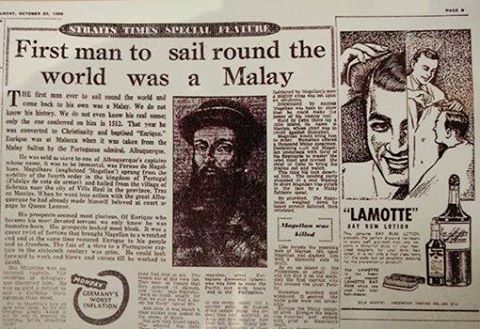
The First Malay Who Circumnavigated the Globe
By Afaf Md Din
Enrique de Malacca (in some sources he was mentioned as “Henry the Black”) was originally from Malay Archipelago, but was enslaved by a Portuguese explorer, Ferdinand Magellan during his expedition to Melaka in 1511. Not many sources mention about him, except he was mentioned as “Panglima Awang” in Malay literature. However, there are no any specific records about him in Malay historical accounts. The most famous comprehensive record about him was found in Magellan’s voyage, written by Antonio Pigafetta, an Italian who joined Magellan’s crew.
According to Pigafetta, Enrique was a Malay originally from Sumatera, and lived in Melaka. During the Portuguese invasion of Melaka in 1511, Enrique was one of the defenders of the city. He was captured by the Portuguese and become a slave of the Magellan’s team. With his good knowledge of navigation and ability to communicate in Malay language, Enrique became a useful person for Magellan as he was in need of an interpreter and a navigator to continue his journey to other parts of Southeast Asia after the capture of Melaka.
In 1512, Magellan returned back to Lisbon with his loyal servant, Enrique. Accused by corruption, Magellan later gave his service to the King Charles of Spain from 1517. Magellan offered his help to Spain to discover a new route sailing westward to Spices Island somewhere in Malay Archipelago. He succeeded to convince the King Charles by introducing Enrique who was well-versed in local language and environment. These qualities of Enrique, together with his great experience were essential to make the next voyage to the Malay world successful.
After convincing the king, Magellan was provided with an army and five sailing ships. They left Spain on 20th September 1519 for their expedition. They crossed the Atlantic and then moved to South America and Pacific; and finally, they reached the Marianas Island on 16th March 1521. This journey continued for almost eight months, and gave a terrible experience to Magellan’s crew. They were facing many hardships like starvation, diseases and mutinies. As soon as they arrived at island, they got food supplies and other necessary equipment, and turned to southward. On 17th March they reached a place what is known today as Philippines. During this time, Enrique played an instrumental role as interpreter. He became the voice and ear between Magellan and the natives.
On 7th April, the expedition had reached a place known as Cebu. Magellan meet Raja Humabon, the ruler of Cebu. Raja asked Magellan to defeat a rebellious group led by a warrior, Lapu Lapu. Magellan agreed and launched an attack on Lapu Lapu forces but was killed on 27th April.
After the death of Magellan, Enrique went into deep mourning. According to Pigafetta, although Enrique was a slave of Magellan, they had a good friendship. Pigafetta wrote that, “He no longer went to ashore to do necessary business but always wrapped in a blanket.”
A new leader of the exploration, Duarte Barbossa wanted to keep Enrique as a translator and decided that Enrique should be a slave of their ship. This decision made Enrique unhappy. He plotted a conspiracy with Raja Humabon against the Spaniards (Barbossa and his shipmate). On the next day, Enrique told the Spaniards that Raja Humabon prepared jewels and presents for the King of Spain and asked them to receive the present. A group of the Spaniards led by Barbossa went to receive the present but they were attacked by the Humabon’s army. Enrique managed to escape from the attack.
After this war, the name of “Enrique” disappeared into the mists of history. Some historians claimed that he returned back to his homeland in Sumatera or found his way back to Melaka. Some of them said that he remained in Cebu.
If he made his way home, indeed, he was the first man who circumnavigated around the globe rather than Ferdinand Magellan or Juan Sebastian del Cano. Although there are many controversies and arguments about him, we can conclude that he did a great achievement in history. He has sailed the seas of the East Indies with Magellan, followed him across Indian Ocean and African continent, continued until Atlantic, South Africa and Pacific. He fought bravely, explored the new world, experienced the new life and culture, and he, indeed, embarked the greatest adventure that no man has done before.
References:
In picture:
An article about Enrique de Malacca published in New Straits Times, 22 October 1955
Copy and paste: HistoriaFactory
27.1.2019: 11.37 am



No comments:
Post a Comment